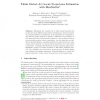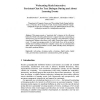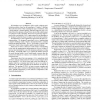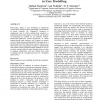478 search results - page 15 / 96 » Computational thinking and thinking about computing |
123
Voted
DIGRA
2005
Springer
15 years 8 months ago
2005
Springer
Game studies methodologies which focus on the visual, narrative, and semiotic content of digital games overlook the way that embodied perception and physiological response contrib...
105
Voted
MICCAI
2009
Springer
16 years 3 months ago
2009
Springer
Estimating the complete set of white matter fascicles (the projectome) from diffusion data requires evaluating an enormous number of potential pathways; consequently, most algorith...
HCI
2007
15 years 4 months ago
2007
This paper presents a “persistent chat” extension to the ePresence Interactive Media webcasting infrastructure to support real-time commenting on and discussing of issues that ...
148
Voted
ICCAD
1997
IEEE
15 years 7 months ago
1997
IEEE
We introduce a new technique to solve exactly a discrete optimization problem, based on the paradigm of “negative” thinking. The motivation is that when searching the space of...
119
Voted
IUI
1997
ACM
15 years 7 months ago
1997
ACM
Historically, efforts at user modelling in educational systems have tended to employ knowledge representations in which symbolic (or "linguistic") cognition is emphasize...




